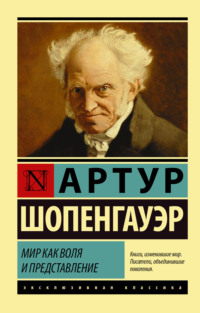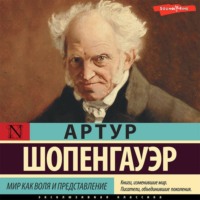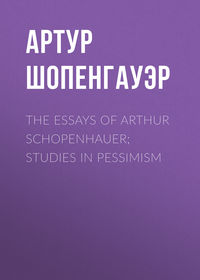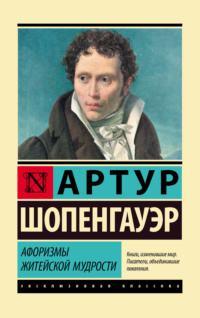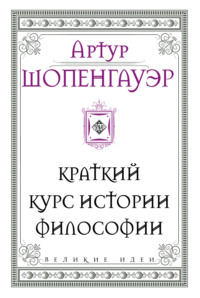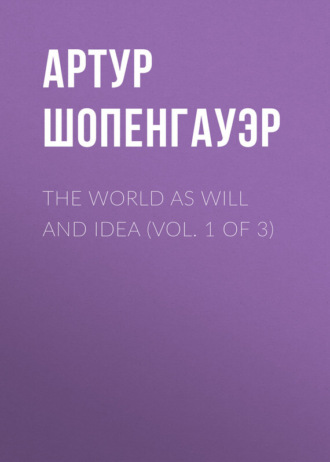 полная версия
полная версияThe World as Will and Idea (Vol. 1 of 3)
Dogmas change and our knowledge is deceptive; but Nature never errs, her procedure is sure, and she never conceals it. Everything is entirely in Nature, and Nature is entire in everything. She has her centre in every brute. It has surely found its way into existence, and it will surely find its way out of it. In the meantime it lives, fearless and without care, in the presence of annihilation, supported by the consciousness that it is Nature herself, and imperishable as she is. Man alone carries about with him, in abstract conceptions, the certainty of his death; yet this can only trouble him very rarely, when for a single moment some occasion calls it up to his imagination. Against the mighty voice of Nature reflection can do little. In man, as in the brute which does not think, the certainty that springs from his inmost consciousness that he himself is Nature, the world, predominates as a lasting frame of mind; and on account of this no man is observably disturbed by the thought of certain and never-distant death, but lives as if he would live for ever. Indeed this is carried so far that we may say that no one has really a lively conviction of the certainty of his death, otherwise there would be no great difference between his frame of mind and that of a condemned criminal. Every one recognises that certainty in the abstract and theoretically, but lays it aside like other theoretical truths which are not applicable to practice, without really receiving it into his living consciousness. Whoever carefully considers this peculiarity of human character will see that the psychological explanations of it, from habit and acquiescence in the inevitable, are by no means sufficient, and that its true explanation lies in the deeper ground we have given. The same fact explains the circumstance that at all times and among all peoples dogmas of some kind or other relating to the continued existence of the individual after death arise, and are believed in, although the evidence in support of them must always be very insufficient, and the evidence against them forcible and varied. But, in truth, this really requires no proof, but is recognised by the healthy understanding as a fact, and confirmed by the confidence that Nature never lies any more than she errs, but openly exhibits and naïvely expresses her action and her nature, while only we ourselves obscure it by our folly, in order to establish what is agreeable to our limited point of view.
But this that we have brought to clearest consciousness, that although the particular phenomenon of the will has a temporal beginning and end, the will itself as thing-in-itself is not affected by it, nor yet the correlative of all object, the knowing but never known subject, and that life is always assured to the will to live – this is not to be numbered with the doctrines of immortality. For permanence has no more to do with the will or with the pure subject of knowing, the eternal eye of the world, than transitoriness, for both are predicates that are only valid in time, and the will and the pure subject of knowing lie outside time. Therefore the egoism of the individual (this particular phenomenon of will enlightened by the subject of knowing) can extract as little nourishment and consolation for his wish to endure through endless time from the view we have expressed, as he could from the knowledge that after his death the rest of the eternal world would continue to exist, which is just the expression of the same view considered objectively, and therefore temporally. For every individual is transitory only as phenomenon, but as thing-in-itself is timeless, and therefore endless. But it is also only as phenomenon that an individual is distinguished from the other things of the world; as thing-in-itself he is the will which appears in all, and death destroys the illusion which separates his consciousness from that of the rest: this is immortality. His exemption from death, which belongs to him only as thing-in-itself, is for the phenomenon one with the immortality of the rest of the external world.68 Hence also, it arises that although the inward and merely felt consciousness of that which we have raised to distinct knowledge is indeed, as we have said, sufficient to prevent the thought of death from poisoning the life of the rational being, because this consciousness is the basis of that love of life which maintains everything living, and enables it to live on at ease as if there were no such thing as death, so long as it is face to face with life, and turns its attention to it, yet it will not prevent the individual from being seized with the fear of death, and trying in every way to escape from it, when it presents itself to him in some particular real case, or even only in his imagination, and he is compelled to contemplate it. For just as, so long as his knowledge was directed to life as such, he was obliged to recognise immortality in it, so when death is brought before his eyes, he is obliged to recognise it as that which it is, the temporal end of the particular temporal phenomenon. What we fear in death is by no means the pain, for it lies clearly on this side of death, and, moreover, we often take refuge in death from pain, just as, on the contrary, we sometimes endure the most fearful suffering merely to escape death for a while, although it would be quick and easy. Thus we distinguish pain and death as two entirely different evils. What we fear in death is the end of the individual, which it openly professes itself to be, and since the individual is a particular objectification of the will to live itself, its whole nature struggles against death. Now when feeling thus exposes us helpless, reason can yet step in and for the most part overcome its adverse influence, for it places us upon a higher standpoint, from which we no longer contemplate the particular but the whole. Therefore a philosophical knowledge of the nature of the world, which extended to the point we have now reached in this work but went no farther, could even at this point of view overcome the terror of death in the measure in which reflection had power over direct feeling in the given individual. A man who had thoroughly assimilated the truths we have already advanced, but had not come to know, either from his own experience or from a deeper insight, that constant suffering is essential to life, who found satisfaction and all that he wished in life, and could calmly and deliberately desire that his life, as he had hitherto known it, should endure for ever or repeat itself ever anew, and whose love of life was so great that he willingly and gladly accepted all the hardships and miseries to which it is exposed for the sake of its pleasures, – such a man would stand “with firm-knit bones on the well-rounded, enduring earth,” and would have nothing to fear. Armed with the knowledge we have given him, he would await with indifference the death that hastens towards him on the wings of time. He would regard it as a false illusion, an impotent spectre, which frightens the weak but has no power over him who knows that he is himself the will of which the whole world is the objectification or copy, and that therefore he is always certain of life, and also of the present, the peculiar and only form of the phenomenon of the will. He could not be terrified by an endless past or future in which he would not be, for this he would regard as the empty delusion of the web of Mâya. Thus he would no more fear death than the sun fears the night. In the “Bhagavad-Gita” Krishna thus raises the mind of his young pupil Arjuna, when, seized with compunction at the sight of the arrayed hosts (somewhat as Xerxes was), he loses heart and desires to give up the battle in order to avert the death of so many thousands. Krishna leads him to this point of view, and the death of those thousands can no longer restrain him; he gives the sign for battle. This point of view is also expressed by Goethe's Prometheus, especially when he says —
“Here sit I, form mankindIn my own image,A race like to myself,To suffer and to weep,Rejoice, enjoy,And heed thee not,As I.”The philosophy of Bruno and that of Spinoza might also lead any one to this point of view whose conviction was not shaken and weakened by their errors and imperfections. That of Bruno has properly no ethical theory at all, and the theory contained in the philosophy of Spinoza does not really proceed from the inner nature of his doctrine, but is merely tacked on to it by means of weak and palpable sophisms, though in itself it is praiseworthy and beautiful. Finally, there are many men who would occupy this point of view if their knowledge kept pace with their will, i. e., if, free from all illusion, they were in a position to become clearly and distinctly themselves. For this is, for knowledge, the point of view of the complete assertion of the will to live.
That the will asserts itself means, that while in its objectivity, i. e., in the world and life, its own nature is completely and distinctly given it as idea, this knowledge does not by any means check its volition; but this very life, so known, is willed as such by the will with knowledge, consciously and deliberately, just as up to this point it willed it as blind effort without knowledge. The opposite of this, the denial of the will to live, shows itself if, when that knowledge is attained, volition ends, because the particular known phenomena no longer act as motives for willing, but the whole knowledge of the nature of the world, the mirror of the will, which has grown up through the comprehension of the Ideas, becomes a quieter of the will; and thus free, the will suppresses itself. These quite unfamiliar conceptions are difficult to understand when expressed in this general way, but it is hoped they will become clear through the exposition we shall give presently, with special reference to action, of the phenomena in which, on the one hand, the assertion in its different grades, and, on the other hand, the denial, expresses itself. For both proceed from knowledge, yet not from abstract knowledge, which is expressed in words, but from living knowledge, which is expressed in action and behaviour alone, and is independent of the dogmas which at the same time occupy the reason as abstract knowledge. To exhibit them both, and bring them to distinct knowledge of the reason, can alone be my aim, and not to prescribe or recommend the one or the other, which would be as foolish as it would be useless; for the will in itself is absolutely free and entirely self-determining, and for it there is no law. But before we go on to the exposition referred to, we must first explain and more exactly define this freedom and its relation to necessity. And also, with regard to the life, the assertion and denial of which is our problem, we must insert a few general remarks connected with the will and its objects. Through all this we shall facilitate the apprehension of the inmost nature of the knowledge we are aiming at, of the ethical significance of methods of action.
Since, as has been said, this whole work is only the unfolding of a single thought, it follows that all its parts have the most intimate connection with each other. Not merely that each part stands in a necessary relation to what immediately precedes it, and only presupposes a recollection of that by the reader, as is the case with all philosophies which consist merely of a series of inferences, but that every part of the whole work is related to every other part and presupposes it. It is, therefore, necessary that the reader should remember not only what has just been said, but all the earlier parts of the work, so that he may be able to connect them with what he is reading, however much may have intervened. Plato also makes this demand upon his readers through the intricate digressions of his dialogues, in which he only returns to the leading thought after long episodes, which illustrate and explain it. In our case this demand is necessary; for the breaking up of our one single thought into its many aspects is indeed the only means of imparting it, though not essential to the thought itself, but merely an artificial form. The division of four principal points of view into four books, and the most careful bringing together of all that is related and homogeneous, assists the exposition and its comprehension; yet the material absolutely does not admit of an advance in a straight line, such as the progress of history, but necessitates a more complicated exposition. This again makes a repeated study of the book necessary, for thus alone does the connection of all the parts with each other become distinct, and only then do they all mutually throw light upon each other and become quite clear.69
§ 55. That the will as such is free, follows from the fact that, according to our view, it is the thing-in-itself, the content of all phenomena. The phenomena, on the other hand, we recognise as absolutely subordinate to the principle of sufficient reason in its four forms. And since we know that necessity is throughout identical with following from given grounds, and that these are convertible conceptions, all that belongs to the phenomenon, i. e., all that is object for the knowing subject as individual, is in one aspect reason, and in another aspect consequent; and in this last capacity is determined with absolute necessity, and can, therefore, in no respect be other than it is. The whole content of Nature, the collective sum of its phenomena, is thus throughout necessary, and the necessity of every part, of every phenomenon, of every event, can always be proved, because it must be possible to find the reason from which it follows as a consequent. This admits of no exception: it follows from the unrestricted validity of the principle of sufficient reason. In another aspect, however, the same world is for us, in all its phenomena, objectivity of will. And the will, since it is not phenomenon, is not idea or object, but thing-in-itself, and is not subordinate to the principle of sufficient reason, the form of all object; thus is not determined as a consequent through any reason, knows no necessity, i. e., is free. The concept of freedom is thus properly a negative concept, for its content is merely the denial of necessity, i. e., the relation of consequent to its reason, according to the principle of sufficient reason. Now here lies before us in its most distinct form the solution of that great contradiction, the union of freedom with necessity, which has so often been discussed in recent times, yet, so far as I know, never clearly and adequately. Everything is as phenomenon, as object, absolutely necessary: in itself it is will, which is perfectly free to all eternity. The phenomenon, the object, is necessarily and unalterably determined in that chain of causes and effects which admits of no interruption. But the existence in general of this object, and its specific nature, i. e., the Idea which reveals itself in it, or, in other words, its character, is a direct manifestation of will. Thus, in conformity with the freedom of this will, the object might not be at all, or it might be originally and essentially something quite different from what it is, in which case, however, the whole chain of which it is a link, and which is itself a manifestation of the same will, would be quite different also. But once there and existing, it has entered the chain of causes and effects, is always necessarily determined in it, and can, therefore, neither become something else, i. e., change itself, nor yet escape from the chain, i. e., vanish. Man, like every other part of Nature, is objectivity of the will; therefore all that has been said holds good of him. As everything in Nature has its forces and qualities, which react in a definite way when definitely affected, and constitute its character, man also has his character, from which the motives call forth his actions with necessity. In this manner of conduct his empirical character reveals itself, but in this again his intelligible character, the will in itself, whose determined phenomenon he is. But man is the most complete phenomenon of will, and, as we explained in the Second Book, he had to be enlightened with so high a degree of knowledge in order to maintain himself in existence, that in it a perfectly adequate copy or repetition of the nature of the world under the form of the idea became possible: this is the comprehension of the Ideas, the pure mirror of the world, as we learnt in the Third Book. Thus in man the will can attain to full self-consciousness, to distinct and exhaustive knowledge of its own nature, as it mirrors itself in the whole world. We saw in the preceding book that art springs from the actual presence of this degree of knowledge; and at the end of our whole work it will further appear that, through the same knowledge, in that the will relates it to itself, a suppression and self-denial of the will in its most perfect manifestation is possible. So that the freedom which otherwise, as belonging to the thing-in-itself, can never show itself in the phenomenon, in such a case does also appear in it, and, by abolishing the nature which lies at the foundation of the phenomenon, while the latter itself still continues to exist in time, it brings about a contradiction of the phenomenon with itself, and in this way exhibits the phenomena of holiness and self-renunciation. But all this can only be fully understood at the end of this book. What has just been said merely affords a preliminary and general indication of how man is distinguished from all the other phenomena of will by the fact that freedom, i. e., independence of the principle of sufficient reason, which only belongs to the will as thing-in-itself, and contradicts the phenomenon, may yet possibly, in his case, appear in the phenomenon also, where, however, it necessarily exhibits itself as a contradiction of the phenomenon with itself. In this sense, not only the will in itself, but man also may certainly be called free, and thus distinguished from all other beings. But how this is to be understood can only become clear through all that is to follow, and for the present we must turn away from it altogether. For, in the first place, we must beware of the error that the action of the individual definite man is subject to no necessity, i. e., that the power of the motive is less certain than the power of the cause, or the following of the conclusion from the premises. The freedom of the will as thing-in-itself, if, as has been said, we abstract from the entirely exceptional case mentioned above, by no means extends directly to its phenomenon, not even in the case in which this reaches the highest made of its visibility, and thus does not extend to the rational animal endowed with individual character, i. e., the person. The person is never free although he is the phenomenon of a free will; for he is already the determined phenomenon of the free volition of this will, and, because he enters the form of every object, the principle of sufficient reason, he develops indeed the unity of that will in a multiplicity of actions, but on account of the timeless unity of that volition in itself, this multiplicity exhibits in itself the regular conformity to law of a force of Nature. Since, however, it is that free volition that becomes visible in the person and the whole of his conduct, relating itself to him as the concept to the definition, every individual action of the person is to be ascribed to the free will, and directly proclaims itself as such in consciousness. Therefore, as was said in the Second Book, every one regards himself a priori (i. e., here in this original feeling) as free in his individual actions, in the sense that in every given case every action is possible for him, and he only recognises a posteriori from experience and reflection upon experience that his actions take place with absolute necessity from the coincidence of his character with his motives. Hence it arises that every uncultured man, following his feeling, ardently defends complete freedom in particular actions, while the great thinkers of all ages, and indeed the more profound systems of religion, have denied it. But whoever has come to see clearly that the whole nature of man is will, and he himself only a phenomenon of this will, and that such a phenomenon has, even from the subject itself, the principle of sufficient reason as its necessary form, which here appears as the law of motivation, – such a man will regard it as just as absurd to doubt the inevitable nature of an action when the motive is presented to a given character, as to doubt that the three angles of any triangle are together equal to two right angles. Priestley has very sufficiently proved the necessity of the individual action in his “Doctrine of Philosophical Necessity;” but Kant, whose merit in this respect is specially great, first proved the coexistence of this necessity with the freedom of the will in itself, i. e., apart from the phenomenon,70 by establishing the distinction between the intelligible and the empirical character. I entirely adhere to this distinction, for the former is the will as thing-in-itself so far as it appears in a definite individual in a definite grade, and the latter is this phenomenon itself as it exhibits itself in time in the mode of action, and in space in the physical structure. In order to make the relation of the two comprehensible, the best expression is that which I have already used in the introductory essay, that the intelligible character of every man is to be regarded as an act of will outside time, and therefore indivisible and unchangeable, and the manifestation of this act of will developed and broken up in time and space and all the forms of the principle of sufficient reason is the empirical character as it exhibits itself for experience in the whole conduct and life of this man. As the whole tree is only the constantly repeated manifestation of one and the same tendency, which exhibits itself in its simplest form in the fibre, and recurs and is easily recognised in the construction of the leaf, shoot, branch, and trunk, so all a man's deeds are merely the constantly repeated expression, somewhat varied in form, of his intelligible character, and the induction based on the sum of all these expressions gives us his empirical character. For the rest, I shall not at this point repeat in my own words Kant's masterly exposition, but presuppose it as known.
In the year 1840 I dealt with the important chapter on the freedom of the will, thoroughly and in detail, in my crowned prize-essay upon the subject, and exposed the reason of the delusion which led men to imagine that they found an empirically given absolute freedom of the will, that is to say, a liberum arbitrium indifferentiæ, as a fact in self-consciousness; for the question propounded for the essay was with great insight directed to this point. Therefore, as I refer the reader to that work, and also to the tenth paragraph of the prize-essay on the basis of morals, which was published along with it under the title “The Two Fundamental Problems of Ethics,” I now omit the incomplete exposition of the necessity of the act of will, which was given at this place in the first edition. Instead of it I shall explain the delusion mentioned above in a brief discussion which is presupposed in the nineteenth chapter of the supplement to the present work, and therefore could not be given in the prize-essay referred to.
Apart from the fact that the will as the true thing-in-itself is actually original and independent, and that the feeling of its originality and absoluteness must accompany its acts in self-consciousness, though here they are already determined, there arises the illusion of an empirical freedom of the will (instead of the transcendental freedom which alone is to be attributed to it), and thus a freedom of its particular actions, from that attitude of the intellect towards the will which is explained, separated, and subordinated in the nineteenth chapter of the supplement, especially under No. 3. The intellect knows the conclusions of the will only a posteriori and empirically; therefore when a choice is presented, it has no data as to how the will is to decide. For the intelligible character, by virtue of which, when motives are given, only one decision is possible and is therefore necessary, does not come within the knowledge of the intellect, but merely the empirical character is known to it through the succession of its particular acts. Therefore it seems to the intellect that in a given case two opposite decisions are possible for the will. But this is just the same thing as if we were to say of a perpendicular beam that has lost its balance, and is hesitating which way to fall, “It can fall either to the right hand or the left.” This can has merely a subjective significance, and really means “as far as the data known to us are concerned.” Objectively, the direction of the fall is necessarily determined as soon as the equilibrium is lost. Accordingly, the decision of one's own will is undetermined only to the beholder, one's own intellect, and thus merely relatively and subjectively for the subject of knowing. In itself and objectively, on the other hand, in every choice presented to it, its decision is at once determined and necessary. But this determination only comes into consciousness through the decision that follows upon it. Indeed, we receive an empirical proof of this when any difficult and important choice lies before us, but only under a condition which is not yet present, but merely hoped for, so that in the meanwhile we can do nothing, but must remain passive. Now we consider how we shall decide when the circumstances occur that will give us a free activity and choice. Generally the foresight of rational deliberation recommends one decision, while direct inclination leans rather to the other. So long as we are compelled to remain passive, the side of reason seems to wish to keep the upper hand; but we see beforehand how strongly the other side will influence us when the opportunity for action arises. Till then we are eagerly concerned to place the motives on both sides in the clearest light, by calm meditation on the pro et contra, so that every motive may exert its full influence upon the will when the time arrives, and it may not be misled by a mistake on the part of the intellect to decide otherwise than it would have done if all the motives had their due influence upon it. But this distinct unfolding of the motives on both sides is all that the intellect can do to assist the choice. It awaits the real decision just as passively and with the same intense curiosity as if it were that of a foreign will. Therefore from its point of view both decisions must seem to it equally possible; and this is just the illusion of the empirical freedom of the will. Certainly the decision enters the sphere of the intellect altogether empirically, as the final conclusion of the matter; but yet it proceeded from the inner nature, the intelligible character, of the individual will in its conflict with given motives, and therefore with complete necessity. The intellect can do nothing more than bring out clearly and fully the nature of the motives; it cannot determine the will itself; for the will is quite inaccessible to it, and, as we have seen, cannot be investigated.




